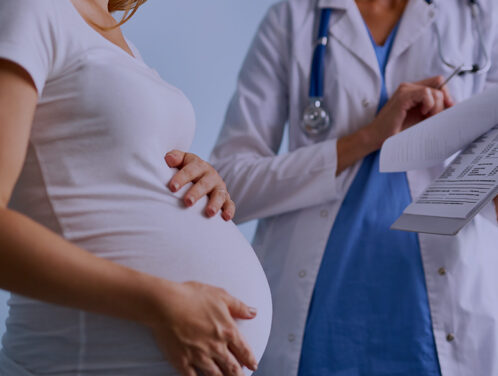When it comes to pregnancy, women know that taking care of their health is the number one priority. Unfortunately, developing a vaginal infection is one risk pregnant women face. Infections can cause complications during pregnancy so early detection and treatment are of utmost importance.
Types of Vaginal Infections in Pregnancy
Vaginal infections may be caused by several factors, including bacterial overgrowth, yeast overgrowth, and sexually transmitted infections or STIs. Testing and treatment of these infections during pregnancy will be our focus here.
Bacterial Vaginosis
Bacterial Vaginosis (BV) is the most common type of infection women experience during pregnancy, affecting one in four pregnant women. BV is not a sexually transmitted infection; it’s caused when the bacteria in the vaginal microbiome falls out of balance and becomes overrun with harmful bacteria.
Researchers don’t know why some women get BV while pregnant, but they know some of the factors that contribute to your risk. These include having new sexual partners or more than one partner, douching and hormonal changes.
Symptoms can include a foul-smelling white or gray discharge, itching, and, if left untreated in pregnant women, BV can increase the risk of preterm labor and low birth weight babies. BV can also lead to pelvic inflammatory disease (PID), a uterine infection that can increase your risk of infertility. This is why it’s so important to get tested and treated for BV if you suspect you have it during pregnancy.
Your healthcare provider can perform a safe, easy BV test by taking a swab of vaginal discharge and sending the swab for laboratory testing. If you have BV while pregnant, you may be treated with antibiotics, which are safe for you and your baby. If you suspect you could have BV during pregnancy, see your OB/GYN immediately for testing and treatment.
Yeast Infections
Except for the annoying itching and burning symptoms, yeast infections are generally harmless during pregnancy. They’re not uncommon either, in fact, about 20 to 30 percent of women will develop one during their third trimester. Some women may be genetically predisposed to yeast infections. Pregnant women may be more susceptible because during pregnancy, elevated hormones may disrupt the normal flora of your vaginal microbiome and allow Candida, a yeast infection-causing fungus, to multiply.
You may be most bothered by yeast infections during the second trimester. The good news is that a yeast infection will not affect your growing baby. But you will become increasingly itchy and irritated if you don’t get treated. If you suspect a yeast infection, see your healthcare professional to rule out anything more serious during your pregnancy and confirm a yeast infection diagnosis.
Yeast infections during pregnancy can be easily treated with a topical antifungal cream or vaginal suppository medication. Studies show that commercially available yeast infection treatments are safe during pregnancy. Three to seven days of treatment is the standard of care to eradicate uncomplicated yeast infections. If you need additional relief from the redness or itchiness, a topical corticosteroid is also safe to use during pregnancy. One caveat with yeast infections is that the oral prescription medication Diflucan, a one-dose pill for yeast infection, is not recommended for pregnant women because it may slightly increase the risk of miscarriage, birth defects or stillbirth.
Sexually Transmitted Infections
Pregnant women should be aware of several sexually transmitted infections. Trichomoniasis, which causes itching, burning, and a foul-smelling discharge, can increase the risk of preterm labor and low birth weight if left untreated. More rarely, there is a chance that the infection can be passed to the baby during delivery. A safe exam by your OB/GYN and lab testing can determine if you have Trichomoniasis. A single dose of antibiotics for both you and your partner is the recommended safe treatment.
Chlamydia, which often has no symptoms or mild ones like discharge, pain during sex, or burning with urination, does carry risk for serious complications during pregnancy when not treated promptly. These include Pelvic inflammatory disease (PID), infertility, and an increased risk of preterm labor. If the infection is present during delivery, the baby can develop serious complications such as eye infections and pneumonia. The antibiotic Azithromycin is shown to be safe during pregnancy and is the recommended treatment.
Likewise, untreated gonorrhea during pregnancy has been linked to preterm births, low birth weight, your water breaking prematurely and exposing the baby to infection, as well as the risk of miscarriage. Gonorrhea can also infect your baby during delivery, most commonly with eye infections and blindness.
Treating gonorrhea as soon as it’s detected in pregnant women reduces the risk of transmission. The treatment is an injection of the antibiotic ceftriaxone intramuscularly or an oral prescription for cefixime.
Screening for STIs is usually recommended early in pregnancy and again in the third trimester for women at risk.
Vaginal Testing While Pregnant
In addition to prompt treatment for various infections, pregnant women can always take precautions including using good hygiene, wearing loose clothing, wiping front to back after the bathroom, avoiding douches, and using condoms during sex.
Most vaginal infections are treatable while pregnant and won’t harm your baby, provided they are caught early enough. It’s always smart to call your doctor if you are experiencing symptoms. The testing available for these infections can be performed without affecting your unborn child.






